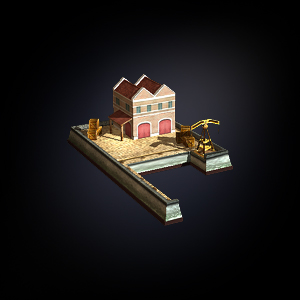Trading Port

Trading Port
Shipping goods of any kind by land is difficult and expensive. Any item that has to travel more than a few miles goes by ship wherever possible. Most roads are simply terrible, and bulk cargoes (such as coal) must go by ship anyway: it is the only way of moving goods cheaply and relatively quickly. It also makes the whole world a marketplace, even if the customers are not sure what to make of the goods they are being sent (British merchants insisted on exporting heavy woollen cloth to India for years, even though there was no obvious market for it). Coastal trade can also be very profitable. For example, a “cheese fleet” did nothing but shuttle back and forth between London and the northwest of England, bringing Cheshire cheeses to the London market. By a happy accident of geology, Cheshire had rock salt mines that provided a preservative for the local cheese to make the sea journey to London. Although salty, this was undoubtedly healthier than most food on a gentleman’s table in the 18th Century
贸易港口:
由于18世纪绝大多数的道路的路况极差,通过陆地运输货物一向困难重重,且花费高昂。因此,任何货物的运输路程若是以英里计的话,只要条件允许就会用船,而大宗货物(如煤炭)的运输则完全依赖水运:这是当时唯一的一种集快捷和廉价于一体的运输方式。同时,水运亦令这个世界成为了一个巨大市场……即使有时候顾客并不知道如何使用他们能得到的货物 (比如英国商人长期坚持向印度出口羊毛制品,虽然那里并没有明显的需求)。沿海贸易有非常丰厚的利润空间,例如当时的"奶酪船队"无非就是在伦敦和英国的西南来回,把柴郡生产的奶酪运输到伦敦的市场。得益于一个意外的的地理发现,人们在柴郡发现了盐矿。食盐作为一种有效的防腐剂使得当地的奶酪可以无损地到达伦敦。尽管这种奶酪有点咸,但无可置疑,在18世纪,它仍然是一个绅士餐桌上最健康的食品之一!
来自:clanlong 翻译及润色人员:astlos,pulom,oliphaunt,charlieshen,kevinly1984,jeffery,sorcererhx,edwardhws,乾盛帝 ,JOHNASON19 ,tokyowar .
相关资讯请关注:帝国:全面战争专区






